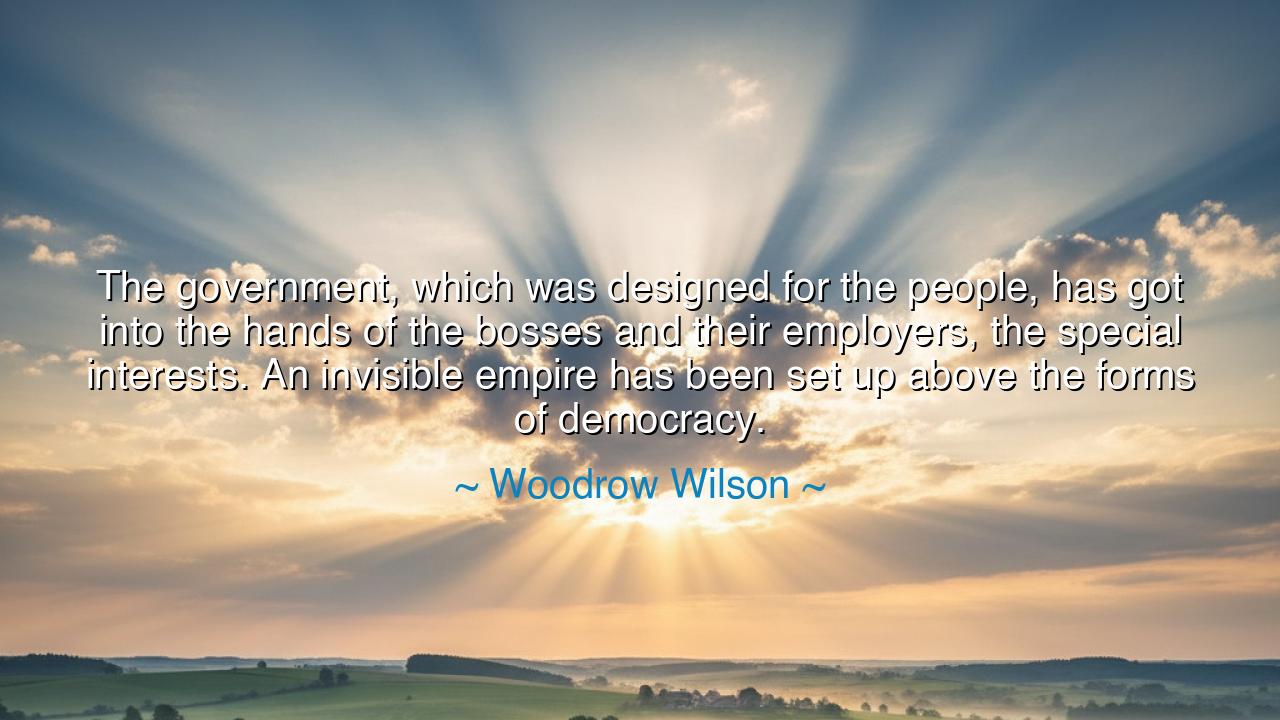
The government, which was designed for the people, has got into
The government, which was designed for the people, has got into the hands of the bosses and their employers, the special interests. An invisible empire has been set up above the forms of democracy.






When Woodrow Wilson proclaimed, “The government, which was designed for the people, has got into the hands of the bosses and their employers, the special interests. An invisible empire has been set up above the forms of democracy,” he was sounding a trumpet of warning — a cry from the heart of a leader who had seen the soul of a republic drifting from its founding purpose. His words, carved with moral anguish, speak of a government meant to serve the common good, yet slowly being corrupted by hidden powers — by the wealthy, the powerful, and the cunning few who rule not through ballots, but through influence. It is a vision both prophetic and timeless: that beneath the visible face of democracy, another force — unseen, unelected, and unaccountable — often pulls the strings of destiny.
The origin of this quote lies in the early years of the 20th century, when Wilson, then the governor of New Jersey and later President of the United States, confronted the rising power of corporate monopolies and political machines. It was the Gilded Age’s dark legacy — a time when industrial barons held more sway over the nation than its citizens did. Railroads, oil empires, and banking interests had entwined themselves with the machinery of politics, buying influence and silencing opposition. Wilson, a scholar before he was a statesman, saw that the government — once envisioned as a guardian of liberty — had become a servant to special interests. His words were not mere politics; they were a lamentation for democracy itself — a system whose body still lived, but whose spirit had been shackled by greed.
When he speaks of an “invisible empire,” Wilson paints an image that transcends his own era. He refers to that shadow realm where wealth and influence corrupt the purity of representation — where decisions are made not in the open halls of debate, but in the hidden chambers of power. In every age, this empire takes a new form: sometimes it is a corporation, sometimes a political party, sometimes a media or technological giant. It does not wear a crown or wave a flag, but it rules nonetheless — dictating laws, shaping economies, and bending justice to its will. And because it operates “above the forms of democracy,” it can endure even while the people believe they are free. Wilson’s warning reminds us that tyranny need not come from kings; it can come from commerce, from complacency, from the quiet rule of the wealthy few.
History offers many mirrors of this truth. Consider the Roman Republic, once proud and free, where the Senate was meant to represent the will of the people. In time, however, its power fell into the hands of a few patricians who used wealth and influence to dominate public life. They called themselves patriots, but their loyalty was to their fortunes. Rome’s democracy withered under their shadow, and from that decay rose emperors — men who promised order but delivered chains. The same lesson echoed in Wilson’s America: that democracy dies not in sudden collapse, but in silent compromise, when the people’s trust is traded for the convenience of the powerful.
Wilson’s words also resonate in the modern age, where the invisible empire wears new faces — global corporations that sway governments, data empires that shape opinion, and lobbyists who whisper into the ears of leaders. The promise of democracy remains, but its pulse grows faint when decisions are made by those who hold wealth instead of wisdom. Yet the power that corrupts also reveals the power that can redeem: the conscience of the people. For every empire of greed, there arises a generation of reformers — those who remember that government was made not for profit, but for purpose. Wilson himself became such a reformer, championing progressive legislation, antitrust laws, and the belief that government should once again be “for the people, by the people.”
The deeper meaning of this quote, however, is not only political — it is moral. Wilson reminds us that when we allow others to govern in our place, when we exchange vigilance for comfort and justice for convenience, we become complicit in our own subjugation. The “invisible empire” thrives on our silence. It grows when citizens forget that they are sovereign, that democracy is not a gift to be received, but a duty to be maintained. The loss of freedom begins not in tyranny, but in indifference.
The lesson is eternal: the health of democracy depends on the virtue of its citizens. No constitution, no law, no leader can protect liberty if the people themselves abandon their role as guardians of truth and justice. Each generation must expose the invisible empires of its time — whether they are corporate, political, or ideological — and reclaim the moral center of government. It begins with awareness, with courage, and with the unyielding conviction that the people are not servants of power, but its rightful masters.
So let this wisdom endure: a democracy that forgets its people will fall to the shadow of unseen kings. Watch the halls of government not with cynicism, but with clarity. Demand transparency, honor, and compassion from those who lead, and never forget that the voice of the people, though often quiet, can shake the thrones of the mighty. For as long as there are hearts that still believe in justice — hearts that will not bow to invisible empires — the flame of democracy will never truly die.






AAdministratorAdministrator
Welcome, honored guests. Please leave a comment, we will respond soon